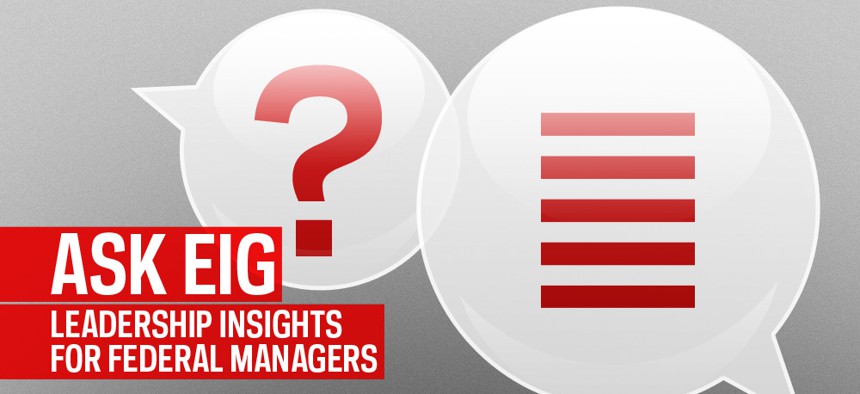
How the Heck Do You Keep on Mission When the Mission is Always Changing?
How to maintain mission priorities in spite of Washington's ever-changing goals.
Ask EIG is your chance to seek answers to public sector management challenges and conundrums. Submit your questions here.
How do we maintain a mission focus for our agency when operationally we are constantly pushed and pulled by administration priorities and political directives? The game seems to always be changing. How do we maintain our constant mission focus over four to eight year cycles when our energies are always getting pulled in divergent directions?
--Anonymous
Almost by definition, working in leadership for a government agency will naturally expose you and your agency to the swirling winds of politics. Every administration has its desires: its agenda, its platform, its set of constituencies and supporters to acknowledge. Like sudden winds storms, every administration also faces political difficulties that can surprise and swirl around it, threatening desires and the potential for re-election. These storms often create pressures for agencies to rapidly respond. It is also important to note that laws and policies usually are written to provide at least some discretion in how the administration implements authorities. It is the conjunction of desires, difficulties, and discretion that opens the door to the pushing and pulling of administrative priorities by political appointees. How can you deliver on your operational commitments and agency mission when appointees are demanding responses to immediate political concerns?
While I have never personally been in your position, I do envision three kinds of strategies that, tongue-in-cheek, I refer to as Agreeing, Blocking, and Serving. “Agreeing” strategies are ones where you do what you are directed to do by your political appointees. In essence, you adopt a compliance approach to your position and follow orders from above. You focus on political directives, which necessarily means a tradeoff of focusing less on your agency’s mission. Agreeing strategies encourage you to satisfy the desires of political appointees and they reduce your liability for decisions that were made by someone above you. Yet Agreeing strategies do create other liabilities for you. Subordinates are likely to think poorly of you as a leader. Maintaining integrity is not easy if your promises keep chaining with the prevailing winds. And, if your integrity is undermined, so too will be your subordinates’ motivation and commitment to the mission.
“Blocking” strategies involve using the inertia of bureaucracy to slow organizational responses to directives. Sometimes inertia can help you wait out at least some directives until political appointments are over. Indeed, Blocking strategies recognize that most political appointees have finite appointments—typically two years. A hard charging and directive appointees who doesn’t listen to, respect, or involve careerists in decision making may be surprised to later discover little progress is made on their directives. With your integrity intact and supportive subordinates, you can help your agency remain somewhat focused on the mission by levering inertia. A downside to such Blocking strategies is that as political directives are stymied, so too are needed efforts to advance your agency’s mission—improving capabilities, tackling organizational problems, increasing employee motivation, etc.. Additionally, blocking strategies do come with some career risk.
“Serving” strategies are different from both Agreeing and Blocking. You can’t use your knowledge and experience to help guide and influence a political appointee if you are not included in the appointee’s trusted circle of advisors. Neither Agreeing nor Blocking strategies will earn you this trust. Serving strategies involve investing in understanding and actively seeking out ways to create value and successes for political appointees. Only after you have demonstrated your good character, good will, and good ability (see Ask EIG “Are You a Leader With ‘The Goods’”) and create value for the appointee will you have a chance of being invited into the appointee’s circle of trusted advisors.
Only then, as a trusted advisor, will you have opportunities to highlight the trade-offs between administrative priorities and agency mission. Your creativity and knowledge of the agency can be extraordinarily valuable in helping appointees respond to directives while simultaneously delivering on the agency’s mission. Unfortunately, Serving strategies work only if an appointee opens up to your efforts to build trust. I believe, however, that the more you give of yourself in making appointees successful, the more likely they will seek out your counsel and involve you in decisions. In sum, you can help political appointees manage the tension between mission and politics only if you invest in becoming a trusted advisor.
Duce a mente (May you lead by thinking),
Jackson Nickerson







